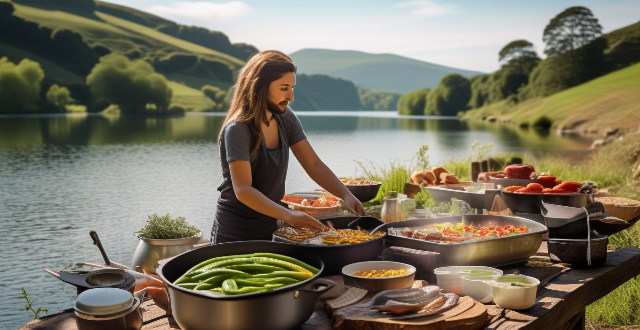Traditional cooking is essential for preserving local food culture, serving as a bridge between past, present, and future generations by maintaining culinary heritage, connecting generations, promoting sustainability, driving economic growth, facilitating cultural exchange, celebrating diversity, and encouraging adaptation and innovation within cuisines.

The Role of Traditional Cooking in Preserving Local Food Culture
Traditional cooking plays a significant role in preserving local food culture. It is the backbone of culinary heritage and serves as a bridge between the past, present, and future generations. Here's how:
1. Maintaining Culinary Heritage
- Preservation of Techniques: Traditional cooking methods are passed down from one generation to another, ensuring that unique techniques are not lost over time.
- Recipe Continuity: Time-honored recipes are maintained, ensuring that classic dishes remain unchanged and continue to represent the local cuisine.
2. Connecting Generations
- Educational Value: Younger generations learn about their cultural identity through traditional cooking practices, fostering a sense of belonging and pride.
- Family Bonding: Cooking traditional meals together strengthens family bonds and creates memories that last a lifetime.
3. Sustainability and Health
- Use of Local Ingredients: Traditional cooking often relies on locally sourced ingredients, supporting sustainable agriculture and reducing the carbon footprint associated with food transportation.
- Nutritional Benefits: Many traditional dishes focus on whole foods and balanced diets, promoting healthier lifestyles.
4. Economic Impact
- Tourism Attraction: Authentic local cuisine attracts tourists, boosting the economy through food tourism.
- Job Creation: The need for skilled chefs, farmers, and other food industry professionals increases with the demand for traditional foods.
5. Cultural Exchange
- Diaspora Connections: Traditional cooking helps maintain cultural connections for people living away from their homeland.
- Global Appreciation: As global cuisines become more intertwined, traditional cooking allows for the appreciation and sharing of diverse food cultures worldwide.
6. Celebration of Diversity
- Festivities and Traditions: Many festivals and celebrations center around traditional foods, reinforcing cultural practices and bringing communities together.
- Unique Flavors: Each region's distinct flavors contribute to the global mosaic of culinary diversity.
7. Adaptation and Innovation
- Evolution of Cuisine: While preserving traditions, cooks often adapt recipes to suit modern tastes or dietary restrictions, ensuring the continued relevance of these dishes.
- Creative Expression: Traditional cooking inspires innovation as chefs experiment with new techniques or ingredients while staying true to their roots.
In conclusion, traditional cooking is vital for preserving local food culture by maintaining culinary heritage, connecting generations, promoting sustainability, driving economic growth, facilitating cultural exchange, celebrating diversity, and encouraging adaptation and innovation within cuisines.